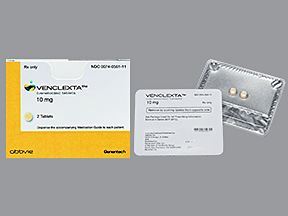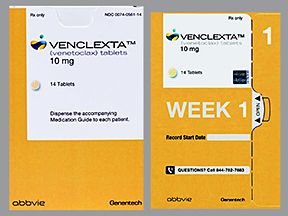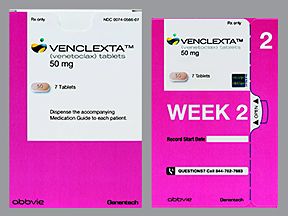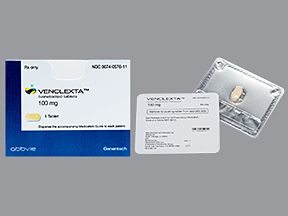If you have cancer, your doctor might suggest Venclexta as a treatment option. It’s a prescription drug used to treat particular types of cancer in adults in certain circumstances. These types of cancer include:
The active ingredient in Venclexta is venetoclax. This is the ingredient that makes Venclexta work.
Venclexta comes as a tablet you take by mouth. It belongs to a group of drugs called BCL-2 inhibitors. It’s a kind of targeted therapy and isn’t a chemotherapy drug.
This article describes the dosages of Venclexta, as well as its strengths and how to take it. To learn more about Venclexta, see this in-depth article.
Note: This article covers Venclexta’s typical dosages, which are provided by the drug’s manufacturer. But when taking Venclexta, always take the dosage your doctor prescribes.
| Venclexta form | Venclexta strengths | Typical dosage |
| oral tablet | • 10 milligrams (mg) • 50 mg • 100 mg | dosage depends on your situation and the condition being treated |
The information below describes the recommended dosages of Venclexta. Your doctor may prescribe a different dosage for you depending on your condition and situation.
What is Venclexta’s form?
Venclexta comes as a tablet you take by mouth.
What strengths does Venclexta come in?
Venclexta comes in three strengths:
- 10 milligrams (mg)
- 50 mg
- 100 mg
What are the typical dosing schedules for Venclexta?
Your doctor will usually start you on a low dose of Venclexta. The starting dose depends on the condition you’re taking the drug to treat. Your doctor will adjust your dosage over time to reach the right amount for you. They’ll ultimately prescribe the smallest dose that provides the desired effect.
The information below describes dosages that are commonly used or recommended. But be sure to take the dosage your doctor prescribes for you. Your doctor will determine the best dosage to fit your needs.
Dosage for acute myeloid leukemia (AML)
Venclexta treatment for AML follows a 28-day cycle. Your dose will increase over the first 3 days. Then, on day 4, you’ll start taking a daily dose of either 400 mg or 600 mg. (How much you take will depend on which other cancer medications you are receiving with Venclexta.) This will be your dose until your treatment ends.
| Venclexta dosage for AML | |
| Day | Daily dose |
| 1 | 100 mg (1 tablet) |
| 2 | 200 mg (2 tablets) |
| 3 | 400 mg (4 tablets) |
| 4 and after, if also taking azacitidine or decitabine | 400 mg (4 tablets) together with azacitidine or decitabine |
| 4 and after, if also taking low-dose cytarabine | 600 mg (6 tablets) together with cytarabine |
Dosage for chronic lymphocytic (CLL) or small lymphocytic lymphoma (SLL)
The Venclexta dosages for CLL and SLL are the same. You’ll start taking a lower dose of Venclexta that will increase each week over the first 4 weeks of treatment. On week 5, you’ll take 400 mg and continue with that dosage unless your doctor recommends a change.
| Venclexta dosage for CLL or SLL | |
| Week | Daily dose |
| 1 | 20 mg (2 x 10-mg tablets) |
| 2 | 50 mg (1 x 50-mg tablet) |
| 3 | 100 mg (1 x 100-mg tablet) |
| 4 | 200 mg (2 x 100-mg tablets) |
| 5 and after | 400 mg (4 x 100-mg tablets) |
Is Venclexta used long term?
How long you take Venclexta depends on your condition and the other medications you’re taking. If you and your doctor determine that Venclexta is safe and effective for you, you might use it long term. You will be given a dosing schedule for taking this medication.
Dosage adjustments
Your doctor may adjust your dose of Venclexta if:
- You have liver problems. If you have severe liver problems, your doctor will likely decrease your Venclexta dosage.
- You’re taking certain other medications with Venclexta. Certain other medications affect how Venclexta works in your body. Your doctor might adjust your dose of Venclexta if you continue to take other medications along with it.
If you miss your dose, and it’s been less than 8 hours since your scheduled time, take it right away. If it’s been more than 8 hours, skip that dose and take the next dose at the usual time.
If you vomit, do not take an additional dose. Wait to take your dose at the next scheduled time.
If you need help remembering to take your dose of Venclexta on time, try using a medication reminder. This can include setting an alarm or downloading a reminder app on your phone.
The dosage of Venclexta you’re prescribed may depend on several factors. These include:
- the type and severity of the condition you’re taking Venclexta to treat
- your age
- other medications you’re taking
- other conditions you may have (see “Dosage adjustments” under “What is Venclexta’s dosage?”)
Your doctor might recommend a dose reduction or adjustment based on one or more of the above factors.
If you’re taking Venclexta for chronic lymphocytic leukemia (CLL) or small lymphocytic lymphoma (SLL), you will likely be given a starter pack. This will have the different strength tablets you’ll need for each week separated into blister packs. Do not remove the tablets from the blister packs until you’re ready to take your dose. Once you start taking the same dose each week, you’ll likely receive medication bottles with the same strength tablets.
Take your dose once per day at about the same time. Swallow all tablets whole. Do not crush, chew, or break the tablets. Take your Venclexta dose with a meal and water. While taking this medication, drink six to eight glasses of water, which is about 56 ounces, each day. Start drinking this amount of water 2 days before your first dose of Venclexta.
Do not drink or eat products that contain grapefruit, Seville oranges, or starfruit while taking Venclexta.
For information on Venclexta expiration, storage, and disposal, see this article.
Accessible drug containers and labels
If you find it hard to read the prescription label on your medication, tell your doctor or pharmacist. Some pharmacies provide medication labels that:
- have large print or use braille
- feature a code you can scan with a smartphone to change the text to audio
Your doctor or pharmacist may be able to recommend pharmacies that offer these accessibility features if your current pharmacy doesn’t.
If you have trouble opening medication bottles or removing tablets from blister packs, let your pharmacist know. They may have tips for opening the drug’s container or blister packs.
Do not take more Venclexta than your doctor prescribes. Taking more than this can lead to serious side effects.
What to do in case you take too much Venclexta
Call your doctor right away if you think you’ve taken too much Venclexta. You can also call 800-222-1222 to reach the American Association of Poison Control Centers, or use its online resource. If you have severe symptoms, call 911 (or your local emergency number) immediately or go to the nearest emergency room.
The sections above describe the typical dosages provided by the drug manufacturer. If your doctor recommends Venclexta for you, they’ll prescribe the dosage that’s right for you.
Remember, you should not change your dosage of Venclexta without your doctor’s recommendation. Only take Venclexta exactly as prescribed. Talk with your doctor if you have questions or concerns about your current dosage.
Here are some examples of questions you may want to ask your doctor:
- Will my dosage of Venclexta change if I have side effects during treatment?
- Why does the dose of Venclexta change when I’m first starting the medication?
- If I take other medications, will I need to take a different dosage of Venclexta?
Q:
If I have liver problems, will my dosage of Venclexta change?
AnonymousA:
Venclexta is broken down in your body by your liver. If your liver’s unable to function properly, Venclexta could build up to high levels in your body. This could be harmful in severe cases. If your doctor believes your liver is unable to clear Venclexta properly, they may decide to decrease your dose. If you have concerns about your liver and taking this medication, it’s important you talk with your doctor.
Elizabeth Scheffel, PharmDAnswers represent the opinions of our medical experts. All content is strictly informational and should not be considered medical advice.Disclaimer: Healthline has made every effort to make certain that all information is factually correct, comprehensive, and up to date. However, this article should not be used as a substitute for the knowledge and expertise of a licensed healthcare professional. You should always consult your doctor or another healthcare professional before taking any medication. The drug information contained herein is subject to change and is not intended to cover all possible uses, directions, precautions, warnings, drug interactions, allergic reactions, or adverse effects. The absence of warnings or other information for a given drug does not indicate that the drug or drug combination is safe, effective, or appropriate for all patients or all specific uses.




